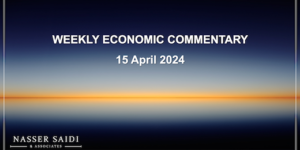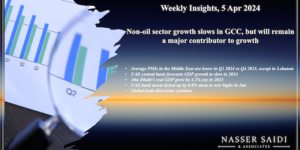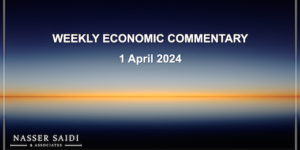Markets
Equity markets in advanced economies seem to have brushed aside Middle East (ME) tensions – world equities, measured by the MSCI All-Country World Index, hit more than 2-1/2 year highs. Meanwhile, the region continues to be adversely affected – Kuwait slumped to a 7-month low and Saudi Arabia was down 3.7%, the largest decline among regional markets. GBP hit a 5-month high on rate hike speculation while Europe’s debt worries and ME unrest fuelled the safe haven demand for the Swiss franc. Geopolitical fears continue to weigh on commodities as oil (Brent) was up to more than $102 a barrel and gold prices surged on safe haven buying.
Global Developments
Americas:
- U.S. retail sales displayed a healthy growth 0.3% mom in Jan. But this was about half the expectation and there were downward revisions to both November and December.
- Housing starts for Jan registered a 14.6% rise to 596k (the highest since Sep) alongside a sharp drop in permits for future home construction.
- The producer price index rose 0.8% mom in Jan, rising for the seventh consecutive month, led by fuel prices. Core PPI, which excludes volatile food and energy costs, rose 0.5%, recording the biggest rise since Oct ‘08.
- Industrial production fell 0.1% mom in Jan (Dec: 1.2%) largely due to a 1.6% drop in utilities output (Dec: +4.1%). Capacity utilization rate also declined to 76.1% in Jan (Dec: 76.2).
- Core CPI, excluding the volatile energy prices, rose 0.2% mom in Jan (Dec: 0.1%), registering the largest increase since Oct 09.
- Initial jobless claims increased 25k to 410k for the week ended Feb 12, indicating a continuing largely jobless recovery.
Europe:
- Dec industrial output fell 0.1% mom on harsh weather conditions, but overall Q4 growth was close to 1.7% qoq (Q3: 1.1%), making a significant contribution to GDP growth.
- Germany’s ZEW indicator of economic sentiment climbed by 0.3 points to 15.7 in Feb, but is still lower than the historical average of 26.7 points.
- Eurozone GDP for Q4- 2010 increased by 0.3% qoq (Q3: 0.3%). GDP growth was slower than expected across the spectrum – Germany at 0.4% (0.7%), Greece at -1.4% and Portugal shrinking 0.3%.
Asia and Pacific:
- China hiked the reserve requirement ratio by 50bps for the second time this year to address growing concerns on inflation. This will increase the deposit reserve ratio for large and small- & medium-sized financial institutions to 19.5% and 16% respectively, which will lead to lower money and credit growth.
- China’s Jan CPI rose 4.9% (Dec: 4.6%), with food prices increasing 10.3%, but was lower compared to Nov’s 5.1%. New loans totaled CNY1.04 trn in Jan and will likely decline with more tightening measures.
- Japan’s economy shrank by 0.3% qoq in Q4, taking real GDP growth to 3.9%. Japan’s full-year GDP valued at $5.47 trillion mean that China overtook Japan as the second largest economy with 2010 GDP at $5.88 trillion.
- Taiwan GDP expanded 6.8% yoy in Q4 on domestic demand, taking full year growth to 10.82%.
- Malaysia announced an expansion of GDP growth by 4.8% in Q4, with full year growth at 7.2%.
Bottom line:
Unrest in the Middle East appears to be spreading and the fears are translating into rising oil prices and higher prices for safe haven currencies and heightened risk aversion. The G20 meeting held over the weekend, meanwhile, seems to have lost its influence – leaving no impact on the markets whatsoever. The leaders are still trying to agree how to measure global imbalances, rather than debate on how to deal with them. A communiqué issued at the end of the meeting highlighted the need to prevent “disorderly movements” and “persistent misalignment” of exchange rates, while maintaining that the global recovery is “strengthening, but is still uneven” and “downside risks remain”. Meanwhile economic recovery remains anemic in Europe with indebted countries in deep recession and the US where the labor market is improving at a snail pace.
Regional Developments
- Egypt’s bourse, which has been closed since Jan 27, has postponed reopening for a third time. It will not open on Sun as planned, and will remain closed until the banking sector operates at full capacity.
- Bahrain’s king announced that each family would receive BHD 1,000 (US$2,652) to mark the 10th anniversary of a national charter for reforms. This is in addition to the inflation allowance announced previously.
- GCC’s mergers and acquisitions are expected to witness an increase in deal flow volume of around 20% yoy in 2011, according to the Middle East M&A Barometer.
- Oman’s oil production jumped 6.5% yoy to one of its highest annual levels of 864,600 bpd in 2010 from nearly 812,500 bpd in 2009, according to data released by the Ministry of National Economy.
- Qatar’s conventional banks with Islamic operations have submitted a proposal to the Qatari regulator that all the banks’ Islamic operations be converted into a single and independent Sharia-compliant bank.
- Moody’s revised Jordan’s Ba2 foreign currency government bond outlook to negative from stable, also issuing a warning that the sovereign rating may be lowered if “there were disruptive political turmoil that threatened a structural weakening of Jordan’s credit fundamentals relative to rating peers.”
- Credit Suisse is planning to raise USD 6.0bn by issuing contingent convertible bonds to Saudi Arabia’s Olayan Group (USD 2.5bn) and Qatar Holding (USD 3.5bn) to meet the new capital adequacy rules. The bonds are to be converted into cash no earlier than October 2013, or exchanged for Tier 1 capital notes issued in 2008.
- Bank Muscat has announced that it would offer payments in Chinese yuan under the tie up with Bank of China to facilitate trade related payments.
UAE Focus
- UAE’s non-oil trade deficit narrowed to AED 161bn in Jan-Sep ‘10 compared to AED 181.6bn a year ago. Exports rose to AED 61.7bn (+39% yoy); imports climbed to AED 250.7bn (+5%); re-exports surged to AED 128bn (+18.5%).
- DFM and ADX are in talks about merging the two exchanges and the regulator would support them whatever the final decision, according to Abdullah Al Turaifi, CEO of the Securities and Commodities Authority.
- ADX plans to host the country’s first IPO in more than two years, when Insurance House launches a USD 16mn IPO on February 27, with the subscription period closing on March 9. This will test the market appetite and will likely boost confidence of others that are waiting in the pipeline.
- UAE’s oil production capacity is 2.8 million bpd, but is currently producing around 2.2 million bpd in line with OPEC targets, according to the Minister of Energy.
- A recent report from Deutsche Bank calculated a 1.9% drop in Dubai’s property prices in Jan while rents dropped 0.7%, also noting that the “supply overhang still looms large”.
- Dubai is expected to witness a 30% rise in FDI inflows in 2011 on a boost in investor confidence along with the strong influx of South American and Chinese companies, as per statements by Fahad Al Gergawi, Chief Executive of the Foreign Investment Office, DED.
- Du has announced a payment of 15% of its net profits to the government in taxes for 2010, which is comparatively much lower than the 50% paid out by Etisalat. The government also waived royalties for 2008 and 2009, when Du had a total net profit of Dh268 million before the royalties.





